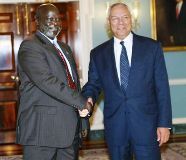US official: Sudan peace accords with southern rebels hold key to peace in Darfur
By RAWYA RAGEH, Associated Press Writer
NAIROBI, Kenya, Sep 10, 2004 (AP) — A top U.S. aid official suggested Friday that Sudan’s framework peace agreement with southern rebels could be a key for to solving the country’s crisis in western Darfur.
 The six protocols — signed between the Sudanese government and the southern Sudan People’s Liberation Army between 2002 and May 2004 — ended a 21-year war in south Sudan through a promise of more inclusive government and sharing of the country’s wealth between north and south.
The six protocols — signed between the Sudanese government and the southern Sudan People’s Liberation Army between 2002 and May 2004 — ended a 21-year war in south Sudan through a promise of more inclusive government and sharing of the country’s wealth between north and south.
The accords constitute “the beginning of a foundation for a new Sudan,” and tackle concerns held by other groups in Africa’s largest nation, Andrew S. Natsios, head of the U.S. Agency for International Development, told reporters in Nairobi before heading to Sudan during a two-week trip to Africa.
The framework peace deal, which has yet to be finalized, would give southern Sudan a referendum on whether to secede at the end of a six-year transition period. Southern rebels would join a power-sharing government in the interim.
“Having elections in Darfur, where there are opposition parties on the ballot, would deal with some of the political problems that the Darfurians are facing,” Natsios said. “It is not just an accord for the south.”
Talks between the government and southern rebels broke off in July, however, after they failed to agree on a permanent cease-fire to end that two-decade conflict, which has killed 2.5 million people.
Natsios, acknowledging there were still “issues” to be resolved over the accords, nevertheless said they could provide a settlement for all Sudan’s disputes, including in Darfur.
Violence erupted in Darfur in February 2003 when two rebel factions, drawn largely from non-Arab African tribes, rose up against the Arab-dominated government in Sudan. The conflict grew out of years of trouble between non-Arab farmers and Arab herdsmen, competing for scarce water and resources in the vast, arid region.
Tens of thousands have been killed in Darfur and an estimated 1.2 million civilians were driven out of their homes in what is described by the United Nations as the world’s worst humanitarian crisis.
The United States and European Union pushed Sudan to do more to end the violence, blamed on pro-government militia called Janjaweed.
On Thursday, U.S. Secretary of State Colin Powell said the atrocities inflicted by the Janjaweed have amounted to genocide.
Sudanese officials, currently in African Union-mediated talks with Darfur rebels in Abuja, Nigeria, have protested Powell’s comments, saying they could undermine peace talks with both the southern and the western rebels.
Natsios dismissed Sudan’s protests as “an unfortunate attempt to manipulate people who are unfamiliar with Sudanese politics.”
He stressed that the U.S. interests were “purely humanitarian,” saying that civil war in Sudan has destabilized the whole region and damaged the economies and political systems of neighboring countries.
“It’s about time it’s ended, so that is our interest.”
He also denied that the U.S. campaign aimed at regime change.
“It is aimed at behavior change within the regime.”
The United States is the largest donor to Darfur, with nearly US$211 million donated since April 2003.
Natsios is on a two-week trip to Africa that began earlier this week. He goes to Sudan on Friday to review the construction program in the south, meet with officials in Khartoum and visit Darfur.
